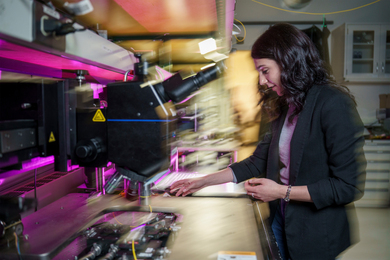Temple Grandin, autism activist, bestselling author, and expert on animal behavior, will be coming to MIT for a series of three events from Monday, March 11 through Tuesday, March 17. Sponsored by the MIT Media Laboratory's Advancing Wellbeing initiative, and funded by the Robert Wood Johnson Foundation, all events are free and open to the public.
Grandin’s books about her interior life as an autistic person have increased the world’s understanding of the condition. In addition, she is also revered for her pioneering work to promote animal welfare. Grandin has lectured widely about how her first-hand experiences with anxiety provided the motivation for her breakthrough research that has brought about more humane handling of livestock.
The week’s events will kick off with the screening of "Temple Grandin," a film that portrays a young woman's perseverance and determination while struggling with the isolating challenges of autism. It stars Claire Danes, Julia Ormond, Catherine O'Hara, and David Strathairn. It will be shown Wednesday, March 11, 7:30 p.m. in Room E15-070 (Bartos Theatre, lower level, MIT Media Lab). Note: There is limited seating available on a first-come, first-served basis.
On Monday, March 16, at 4:30 p.m., Grandin will give a special talk, "Helping Different Kinds of Minds Succeed,” in Room E14-674, the Media Lab’s sixth-floor multipurpose room. This event is co-presented with the Simons Center for the Social Brain.
The final event will be a conversation between Grandin and Rosalind Picard, professor of Media Arts and Sciences, who heads the Media Lab’s Affective Computing research group and is a co-leader of the lab’s Advancing Wellbeing initiative. It will be held on Tuesday, March 17 at 11:00 a.m. in the Media Lab’s third-floor atrium (Building E14).
Grandin was born in Boston, Massachusetts. By age two she still had no speech and all the signs of severe autism. Going against doctors’ recommendations, her mother did not institutionalize her, but rather spent many hours ensuring that she received intensive therapy. She went on to obtain a BA at Franklin Pierce College in 1970, an MS in animal science from Arizona State University in 1975, and a PhD in animal science from the University of Illinois in 1989. She is currently a professor at Colorado State University. Grandin is known internationally for her extensive work on the design of animal handling facilities: Half the cattle in the U.S. and Canada are handled in equipment she has designed, focused on humane treatment of animals. In 2010 Grandin was listed in the TIME 100 list of the most influential people in the “heroes” category. She is the subject of the documentary "The Woman Who Thinks Like a Cow" (2006), and was also a subject in Errol Morris’s series "First Person." She has been featured in The New York Times, Forbes, Discover magazine, and NPR.
With support from the Robert Wood Johnson Foundation, the Media Lab's Advancing Wellbeing initiative addresses the role of technology in shaping our health, and explores new approaches and solutions to wellbeing. The program is built around education and student mentoring; prototyping tools and technologies that support physical, mental, social, and emotional wellbeing; and community initiatives that will originate at the Media Lab, but be designed to scale.







